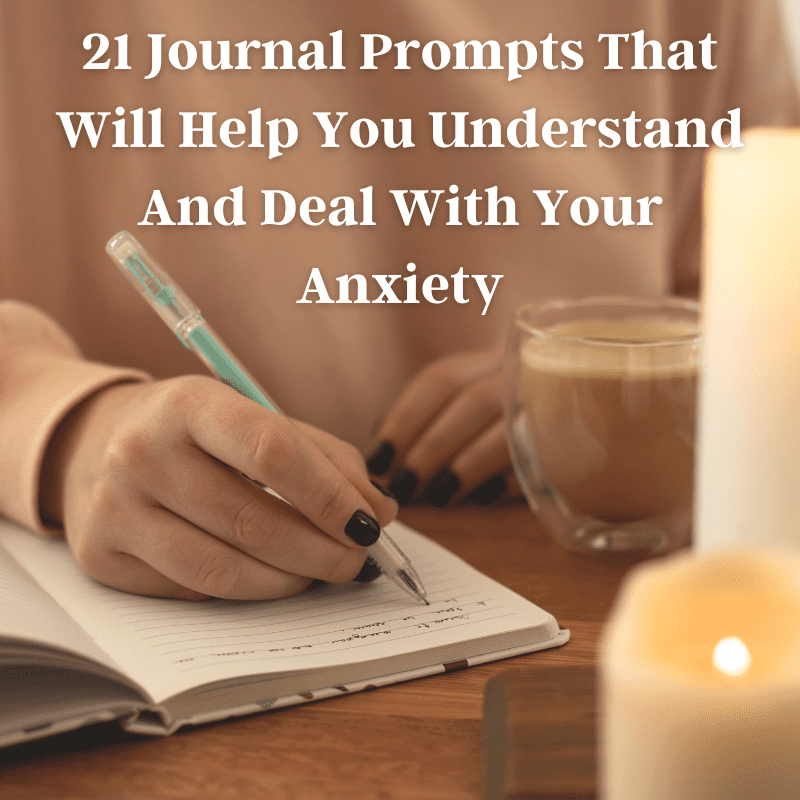Last Updated on April 26, 2022 by Jen
Anxiety can be paralyzing. It can keep you from doing the things you want to do and from being the person you want to be. It can make life feel like a never-ending nightmare. If you’re struggling with anxiety, know that you are not alone. Millions of people around the world deal with anxiety on a daily basis. Thankfully, there are ways to cope with anxiety and overcome it. In this blog post, we will discuss 21 journal prompts that can help you start to understand and deal with your anxiety better.
21 Journal Prompts For Anxiety
1. What are some things that trigger your anxiety?
Dealing with anxiety can be a difficult and ongoing process. However, one way that can help ease anxiety is by knowing and avoiding triggers.
A trigger is anything – a situation, a smell, a sound – that sets off an anxious reaction.
For some people, triggers are very specific, while for others they may be more general.
Identifying triggers is often a matter of trial and error, but it can be helpful to keep a diary of anxious episodes in order to identify patterns. Once triggers have been identified, it may be possible to avoid them or to prepare for them in advance.
In some cases, it may also be possible to desensitize yourself to a trigger by gradually exposing yourself to it in a safe and controlled environment. By understanding what triggers your anxiety, you can take steps to avoid or reduce its impact.
2. What are some things you do to try and cope with your anxiety?
Are you implementing any techniques to cope with your anxiety?
Reflect on what have learned about coping with anxiety to this point and how has it helped you reduce your anxiety?
3. What are some of the thoughts or feelings that go through your head when you’re experiencing an anxiety attack?
Identify what thoughts and feelings you have when experiencing an anxiety attack.
Knowing what you think and feel like can help you recognize when an anxiety attack is coming and also help you understand what thoughts are not working for you when it comes to reducing or eliminating your anxiety.
4. When do you find that you experience the most anxiety?
Who, what, where, and when… think of these things as you decide when you experience the most anxiety.
Being specific like this can further help you dig into what causes your anxiety and how you may be able to avoid those things in the future.
5. What are some of your biggest fears?
There are various reasons why fear may cause anxiety. One reason is that anxiety can be a learned behavior. If someone has witnessed a traumatic event, they may become anxious in similar situations in the future.
What fears do you have and is it possible they are encouraging your anxiety? How can you work on them?
6. Are there any certain places or situations that make you feel particularly anxious?
One way to reduce anxiety is to take some time to prepare for the situation or activity that is making you anxious. This might involve doing some research, such as reading about the event or place you’re anxious about or practicing what you need to do beforehand.
It can also be helpful to identify any thoughts or beliefs you have about the situation that might be contributing to your anxiety and challenge these thoughts.
7. What does anxiety feel like for you?
Everyone experiences anxiety at some point in their life. For some people, anxiety can be a short-lived response to a stressful situation, such as public speaking or taking an exam. However, for others, anxiety can be a more chronic condition that develops over time and can have a major impact on day-to-day activities
8. What makes you feel calm and relaxed?
It’s also important to take care of yourself both physically and mentally. This means eating a balanced diet, getting regular exercise, and getting enough sleep. Managing stress in healthy ways, such as through relaxation techniques or mindfulness, can also help reduce anxiety.
What methods work for you?
9. What do you find helps you to cope with an anxiety attack when it’s happening?
Anxiety attacks are characterized by symptoms such as a racing heart, shortness of breath, and feelings of panic or dread.
If you find yourself experiencing an anxiety attack, there are a few things you can do to help cope with the symptoms.
First, try to focus on your breathing. Take slow, deep breaths and count to four as you inhale and exhale. This will help to slow down your heart rate and ease your anxiety.
Secondly, try to focus on something else. This can be done by focusing on an object in the room or thinking about something positive in your life. By redirecting your focus, you can help to ease the anxiety and prevent the attack from getting worse.
Lastly, if you are able, take a walk outside or do another activity that you enjoy. This will help to take your mind off of the anxiety and allow you to relax.
10. How has your attitude towards your anxiety changed over time?
Has it gotten worse, or has it gotten better?
If you find yourself feeling worse about your anxiety, and you have tried to cope with it on your own, you should seek some sort of help.
If anxiety is impacting your life in a significant way, it’s important to seek professional help from something or someone who can provide support and guidance. With treatment and self-care, it’s possible to reduce anxiety and live a more enjoyable life.
11. What are some of the negative ways anxiety has impacted your life?
Want to overcome anxiety? By listing the ways that anxiety has negatively impacted your life, you can start to build up a solid foundation for why you want to work on overcoming your anxiety.
For instance, you may not think about all the things anxiety is negatively doing to your life, but upon reflection, you may realize that anxiety is:
- Keeping you from the relationship you want.
- Keeping you from the job you want.
- Keeping you from going out and doing things that you love.
- Making you miserable and depressed.
Essentially, this journal prompt can help you get to the ‘enough is enough’ point.
12. What are some of the positive ways anxiety has impacted your life?
Has anxiety affected your life positively?
Weigh the negative and positive ways anxiety has impacted your life, and if you find the scale tipped heavily towards the negative side, this can be another motivator to take action on your anxiety.
13. Do you think there’s anything you can do to reduce your anxiety? If so, what?
Do you currently know of anything that you can do to reduce your anxiety that you are not doing?
List out ways you can reduce your anxiety starting today and then create habits or goals around those things so you can implement strategies right away.
One great way is to start talking to yourself differently. Affirmations geared towards reducing anxiety can really help you shift the way you think and feel.
14. What do you think causes your anxiety?
Learned behavior? Fear? Worry? These are common causes of anxiety.
Another reason is that some people are born with a predisposition to anxiety disorders. This means that they are more likely to experience anxiety than people without this predisposition. Does anxiety run in your family?
Lastly, anxiety can be caused by physical health conditions, such as an overactive thyroid or low blood sugar levels. While the exact cause of anxiety is not known, it is clear that it can have a significant impact on an individual’s life.
15. Is there anything you’re anxious about that you know you shouldn’t be? Why do you think that is?
Sometimes a new perspective can shift the way you view something.
For instance, if you have gotten into the habit of being anxious about going into a store, take some time to reflect on that.
Why are you anxious about it and why shouldn’t you be anxious about it?
Did something happen that you are not letting go of or are you just stuck in a habit of being anxious for no real reason?
16. Do you think people who don’t suffer from anxiety can understand what it’s like? Why or why not?
Shift your perspective even more by stepping into someone else’s shoes and try and understand how they view anxiety.
How do they tackle situations that make you anxious?
Do you think they would understand why those activities make you anxious? Why or why not?
17. Have you ever tried to explain your anxiety to someone who doesn’t suffer from it? How did it go?
If it didn’t go well, reflect on that.
If someone didn’t understand where you were coming from, one reason may be because you were not able to articulate it in a way that they could understand.
After using these journal prompts for anxiety, you may be able to better explain why anxiety happens to you and increase your chances of getting support from them.
Of course, someone not being able to understand your anxiety may simply be because they’ve never experienced it and can’t understand it, no matter how well you explain it.
18. Do any of your close friends or family suffer from anxiety? If so, do you find that it affects your relationship with them?
View anxiety from an outside perspective. If you know someone who suffers from anxiety, how does it affect your relationship with them?
What do you see in them?
How do you feel about them?
19. What do you think would be the biggest challenge you would face in life if you didn’t have anxiety?
Now step into your shoes… without anxiety.
What would life be like?
What challenges would be waiting for you?
20. Do you think there’s anything good about having anxiety? If so, what is it?
While anxiety is typically viewed as a negative and debilitating condition, there are some aspects of anxiety that can be seen as beneficial.
For one thing, anxiety often helps us to focus our attention on possible threats or risks in our environment. By triggering the release of adrenaline and other related hormones, anxiety makes us more alert and better equipped to deal with potential dangers.
Additionally, anxiety can also serve to motivate us, driving us out of situations that we find uncomfortable or challenging. While it would be preferable not to experience anxiety at all, understanding its complex nature may help us make sense of this distressing emotion and learn how to cope with it more effectively.
21. What do you think is the best way to deal with anxiety? Why?
Many people deal with anxiety on a daily basis. Whether it’s worry about work, school, or personal relationships, anxiety can take a toll on both your mental and physical health.
Fortunately, there are many ways to deal with anxiety and overcome it.
One way to deal with anxiety is to identify the source of your anxiety and find healthy ways to cope with it. For example, if you’re anxious about an upcoming test, you might try studying in short bursts or taking breaks to relax.
If you find that your anxiety is impacting your ability to function in daily life, you might want to seek professional help. Therapists can help you identify healthy coping mechanisms and work through the root causes of your anxiety. With help, you can learn how to deal with anxiety in a healthy way and improve your quality of life.






